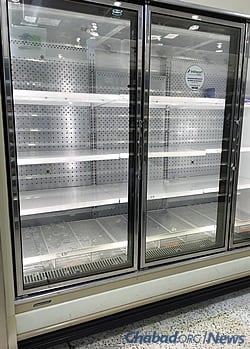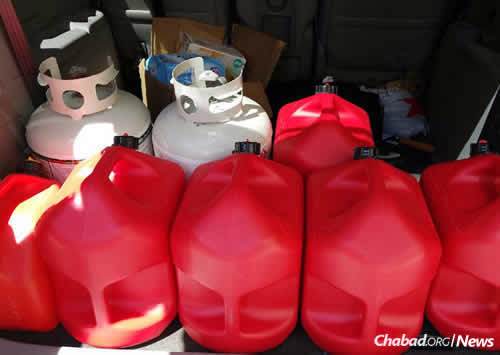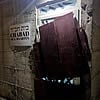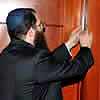Supermarket shelves are stripped bare in cities and towns throughout Southeast Florida, as people sit car behind car, in line for hours waiting to fill up on fuel and listening as news reports become more dire by the hour. Everyone is making calculated decisions whether or not to evacuate and when, as government officials stress that time is not on their side.
At Chabad centers across the state, preparations are being made to protect life and property as the Category 5 hurricane, which has already claimed 10 lives, continues to barrel its way across the Caribbean. Current forecasts predict that sometime Sunday morning, Irma will hit Miami head on.
Because both Miami Beach and Miami proper consist of densely populated high-rise buildings on flat land that floods in much milder storms, state and local officials have ordered mandatory evacuations, as well for as the Florida Keys and other low-lying areas across the eastern coast that are vulnerable to storm surges. One major unknown factor is how forcefully this storm will impact the rest of Florida and other states as it moves northwards up the East Coast.
“It’s a little surreal,” says Rabbi Chaim Lipskar, co-director with his wife, Deenie, of the Shul of Downtown, which serves a large number of Jewish young professionals. “The streets are empty. Offices are closed. I’ve never seen a hurricane where they have prepared so much in advance. People started leaving on Tuesday and Wednesday and it’s not even expected to hit until Sunday.”
Lipskar, who has five young children at home, says as much as 50 percent of his community is determined to remain in town. Their family plans on riding out the storm in the 20,000-square-foot, three-year-old Chabad House, which, Lipskar says, “ is made of solid steel and concrete, and can handle hurricane-force winds.”

They will not be alone; the Lipskars anticipate having extended family and some community members staying with them. “We have gas generators, food and water; we are all set up,” says the rabbi. “We are going to hunker down and hope for the best.”
Though the Chabad House is just two blocks from the water and prone to flooding, as is the Lipskar family home, the rabbi believes that the Chabad House will be a safer option since it has multiple floors and numerous “safe” rooms, ones with no windows and plenty of interior walls.
“We have other Chabad emissaries with us, and we are planning to have a beautiful Shabbat farbrengen here, and then we’ll wait and see,” he says. “Hopefully, Hurricane Irma will turn.”

Rabbi Yaakov Zucker, co-director of Chabad Jewish Center of the Florida Keys in Key West, enlisted the help of community members to take down awnings outside of the local mikvah and Chabad House playground. The center’s Torah scrolls were removed from the ark where they are housed. Zucker will be taking at least one of the scrolls with his family if and when they evacuate the island. The others have been placed in a more secure spot.
Evacuation orders led to the closure on Wednesday afternoon of the Lubavitch Educational Center, where some 1,500 students from preschool through high school are enrolled. The school, which has several campuses in the greater Miami area, will remain closed for the next few days.

According to Rabbi Benzion Korf, the school’s headmaster, teachers reminded students “to be safe and careful, and that everything that happens is a preparation for the coming of Moshiach. We need to do and bring about acts of goodness and kindness, and this is an opportunity to put that into action by helping others.”
The Lubavitch Educational Center also runs a talmudical school for post-high school education. Korf says the young men from that program are fanning out across Florida to help Chabad emissaries and their local communities.
Campus Chabad to Serve as Shelter
In Jacksonville, Fla., in the far northeastern part of the state, Chabad emissaries at the University of Florida are preparing to shelter in place, and hoping to maintain a regular Shabbat schedule and open their doors to anyone in need.
In an email sent to students, Rabbi Berl and Chanie Goldman, co-directors of the Tabacinic Lubavitch-Chabad Jewish Student & Community Center, wrote: “Many South Florida area residents have taken shelter in our area, and many more are expected to arrive Thursday and Friday. If your friends and family are in town, please let them know that all are welcome for meals, and to utilize the center’s facilities and for gathering, etc.


“If the weather intensifies in our area [Saturday night and Sunday], and you have to leave your house, apartment or student housing and need a place to go, please let us know,” the letter went on to say. “If any student is afraid to be in their apartment, home or dorm, you can come over and stay at Chabad until the storm passes.”
Also encouraging Florida residents to their doors are Chabad Houses in Atlanta, about a five-hour drive from the northern Florida border. According to Rabbi Isser New, who coordinates programming for Chabad Lubavitch of Georgia, he started getting calls earlier in week from those looking for places to stay, especially during Shabbat. He says people in his area didn’t hesitate, especially after just witnessing all the displacement from Hurricane Harvey in Texas.

The rabbi estimates that between 75 and 100 residents of South Florida have already signed up to stay with families in Georgia’s capital; an online application form for those seeking home hospitality remains active.
With the latest computer models showing the possibility of Hurricane Irma eventually reaching eastern Georgia or the Carolinas, people in those regions are starting to make preparations as well.
Government officials in Charleston, S.C., were already sounding alarm bells on Thursday morning as they began distributing sandbags to local residents.









Start a Discussion